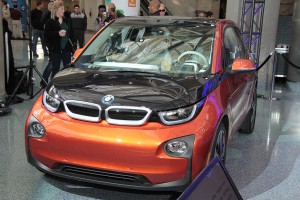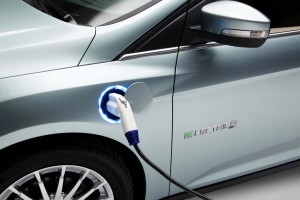
BMW recently cut the lease price on its electric i3 model to $239 a month. The maker isn't alone in reducing prices.
Gas prices aren’t the only prices dropping these days. Automakers are cutting prices on their electric vehicles.
Despite strong sales early on, BMW recently announced buyers can lease an i3 for as low as $239 a month. However, just after that, Honda put out a new $199 lease for its Fit EV subcompact. The new lease price is a $60 a month cut from its previous offer of $259 a month.
It’s not just the leases prices. Heading into this year, Ford announced it was cutting the price of its Focus battery electric vehicle as well: by $6,000. The new starting price is $29,995 before any federal, state or local incentives are applied, which can cut the final price as much as $7,500. It was the second time the automaker cut the price on the Focus. It cut it $4,000 in 2013 hoping to drive sales then.
With gas prices at near record lows, an electric vehicle can be a tough sell these days and automakers needed to do something to spur sales. Fortunately, the price cuts appear to be having an impact.

Ford slashed another $6,000 off its Focus EV giving it a starting price of $29,995 before any federal, state or local government incentives.
According to the Electric Drive Transportation Association, sales of plug-ins (hybrids and pure battery electrics) are up slightly through the first two months of 2015 compared with year ago figures: 13,114 v. 12,950.
However, the good news ends when non-plug-in hybrids are lumped into the equation. The numbers dip on a year-over-year basis to 65,464 units through February this year compared with 70,596 for the same period last year.
The best-selling EV, the Nissan Leaf, saw a 12% jump from January to February, while BMW’s i3 put up good numbers: 1,089 in February. The Chevy Volt and Toyota Prius are both struggling with their plug-in models. Chevy sold 693 Volts last month and 542 in January while Toyota delivered 397 Priuses in February, down four units from January’s total of 401.
(EV battery costs dropping faster than expected. For more, Click Here.)
The surprise winner for the first two months of the year: Ford. The Dearborn, Michigan-based maker delivered 498 C-Max Energi compact hatchback plug-in hybrids, and 603 Fusion Energi mid-size sedans, plus 145 Focus Electrics.
Talking EV sales in January and February is tough to begin with as the months are traditionally the worst sales months for plug-ins. Some makers pointed to other reasons as well.
“Tough winter weather in several key markets held EV sales back in February. As we head into spring, we look forward to seeing more dealership traffic so shoppers can experience firsthand the benefits of the all-electric Nissan Leaf,” said Brendan Jones, director, Nissan Electric Vehicle Sales and Infrastructure, in a statement.
(Click Here for details gas prices remaining flat.)
While the low gas prices may be forcing makers to re-examine what they’re charging for these vehicles, one factor working in their favor is the fact that battery prices are coming down quickly.
Cells for electric vehicles fell about 14% a year from 2007 to 2014, according to a Stockholm Environment Institute study. Battery cell costs will fall about 8% a year. Based an analysis of more than 80 separate estimates of the costs of lithium-ion battery cells, the study found that estimates fell from more than $1,000 to around $410 per kilowatt-hour during 2007 and 2014.
(To see more about Mercedes planning to launch 10 plug-ins by 2017, Click Here.)
Navigant Consulting Inc. also recently told Bloomberg battery packs for electric vehicles, loaded with lithium-ion cells, now cost around $496 a kilowatt-hour, a 60% drop from 2010. That could plunge to $175 within five years, according to Sam Jaffe, an industry analyst with Navigant.

It’s a rip-off for tax payers to be subsidizing EVs when EV owners don’t even pay road taxes like all who buy fuel. We should not be paying for EV charging stations either. That’s what commercial businesses are for just like gas stations – none of which are paid for by taxes.
Jorge, despite the highway taxes that come out of fuel costs there have been countless subsidies for the automobile…and for the fuel we use…over the past century. And so it was for railroads, airplanes, even canals. We can dispute whether this is a good place to put tax money but let’s recognize tax money has gone into every form of mass transit since the founding of the republic.
Paul E.
EV’s are not Mass Transit… LOL
And yes I am aware that politicians do lots of unscrupulous and ignorant things. Providing tax credits and not charging EV users road taxes are just TWO very bad decisions by the criminals currently in power.
My point however was that since EV users use the same roads as everyone else, they should pay for that use like everyone who buys fuel does with fuel taxes. In addition the government has never paid to have gas stations built nor should they. If EV buyers want public recharging stations then they should lobby commercial Biz to build them and EV owners should pay for them, NOT tax payers.
Since corporations dont want to buy carbon credits yet still want pollute the planet its a trade off that is ok for now. And if the the airlines want to buy my carbon credits that I produce from my solar panels on my house that recharges my nissan leaf that pays no road tax because it produces no carbon, I figure for now I’m figure were even for now. lol
Jorge
Glad to pay road taxes for my EV, as soon as you start picking up my share of defense spending to keep your gas guzzler drinking subsidized cheap fuel. While you are at it you can pay my share of the Exxon tax breaks, the TRUE cost of BP destroying the Gulf, etc.
Don’t try to drag non-related issues into the discussion to rationalize the improper EV subsidies.
I’m all for holding the oil companies 100% responsible for their damages to the planet. In addition I do not believe ANY oil company should receive subsidies or tax breaks. You need to replace the criminals running the country if you want to stop these criminal acts along with EV tax breaks and failure to pay road taxes.
I personally believe the oil companies should be paying an “excess profit” tax for exploiting consumers. That would fix a lot of issues.
So two, three, four or hundreds more improper and illegal decisions by politicians does not make it acceptable or reasonable to allow EV owners to receive tax breaks or escape paying road taxes. These are just more examples of government being bought off for the detriment of tax payers.